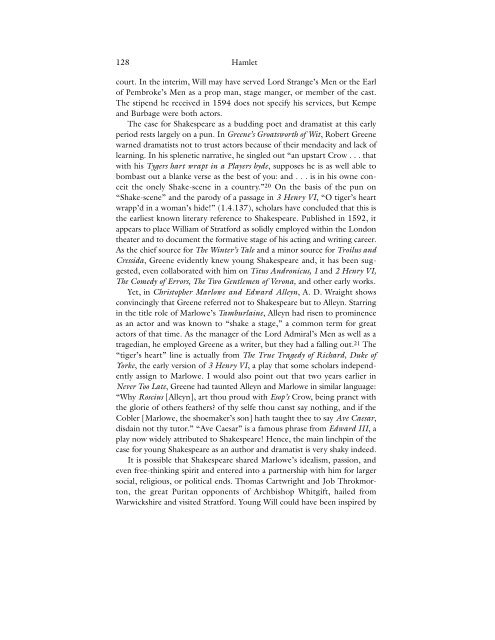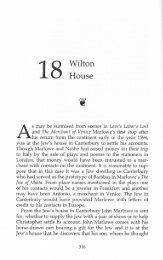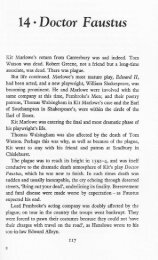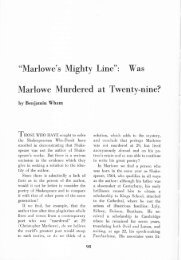Page 113-180 Shakespeare - The Marlowe Studies
Page 113-180 Shakespeare - The Marlowe Studies
Page 113-180 Shakespeare - The Marlowe Studies
Create successful ePaper yourself
Turn your PDF publications into a flip-book with our unique Google optimized e-Paper software.
128 Hamletcourt. In the interim, Will may have served Lord Strange’s Men or the Earlof Pembroke’s Men as a prop man, stage manger, or member of the cast.<strong>The</strong> stipend he received in 1594 does not specify his services, but Kempeand Burbage were both actors.<strong>The</strong> case for <strong>Shakespeare</strong> as a budding poet and dramatist at this earlyperiod rests largely on a pun. In Greene’s Groatsworth of Wit, Robert Greenewarned dramatists not to trust actors because of their mendacity and lack oflearning. In his splenetic narrative, he singled out “an upstart Crow . . . thatwith his Tygers hart wrapt in a Players hyde, supposes he is as well able tobombast out a blanke verse as the best of you: and . . . is in his owne conceitthe onely Shake-scene in a country.” 20 On the basis of the pun on“Shake-scene” and the parody of a passage in 3 Henry VI, “O tiger’s heartwrapp’d in a woman’s hide!” (1.4.137), scholars have concluded that this isthe earliest known literary reference to <strong>Shakespeare</strong>. Published in 1592, itappears to place William of Stratford as solidly employed within the Londontheater and to document the formative stage of his acting and writing career.As the chief source for <strong>The</strong> Winter’s Tale and a minor source for Troilus andCressida, Greene evidently knew young <strong>Shakespeare</strong> and, it has been suggested,even collaborated with him on Titus Andronicus, 1 and 2 Henry VI,<strong>The</strong> Comedy of Errors, <strong>The</strong> Two Gentlemen of Verona, and other early works.Yet, in Christopher <strong>Marlowe</strong> and Edward Alleyn, A. D. Wraight showsconvincingly that Greene referred not to <strong>Shakespeare</strong> but to Alleyn. Starringin the title role of <strong>Marlowe</strong>’s Tamburlaine, Alleyn had risen to prominenceas an actor and was known to “shake a stage,” a common term for greatactors of that time. As the manager of the Lord Admiral’s Men as well as atragedian, he employed Greene as a writer, but they had a falling out. 21 <strong>The</strong>“tiger’s heart” line is actually from <strong>The</strong> True Tragedy of Richard, Duke ofYorke, the early version of 3 Henry VI, a play that some scholars independentlyassign to <strong>Marlowe</strong>. I would also point out that two years earlier inNever Too Late, Greene had taunted Alleyn and <strong>Marlowe</strong> in similar language:“Why Roscius [Alleyn], art thou proud with Esop’s Crow, being pranct withthe glorie of others feathers? of thy selfe thou canst say nothing, and if theCobler [<strong>Marlowe</strong>, the shoemaker’s son] hath taught thee to say Ave Caesar,disdain not thy tutor.” “Ave Caesar” is a famous phrase from Edward III, aplay now widely attributed to <strong>Shakespeare</strong>! Hence, the main linchpin of thecase for young <strong>Shakespeare</strong> as an author and dramatist is very shaky indeed.It is possible that <strong>Shakespeare</strong> shared <strong>Marlowe</strong>’s idealism, passion, andeven free-thinking spirit and entered into a partnership with him for largersocial, religious, or political ends. Thomas Cartwright and Job Throkmorton,the great Puritan opponents of Archbishop Whitgift, hailed fromWarwickshire and visited Stratford. Young Will could have been inspired by






